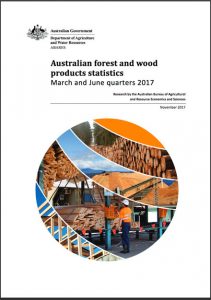
Australia’s sustainable forest product industries had a record log harvest in 2016-17, increasing in both value and volume, according to statistics and forecasts published by the Australian Bureau of Agricultural and Resource Economics and Sciences (ABARES). Source: Timberbiz
The ABARES report for the March and June quarters 2017 shows growth in demand for Australia’s sustainably managed wood products resulted in an estimated record harvest of logs of up to 33 million m3, worth $2.5 billion.
A report released by the Australian Bureau of Agricultural and Resource Economics and Sciences (ABARES) highlights that Australia’s forestry sector is continuing to enjoy some of the best conditions in its history.
ABARES Executive Director, Steve Hatfield-Dodds, said the report, Australian forest and wood products statistics: March and June quarters 2017, showed the industry is now in its fourth consecutive year of growth.
“In 2016−17, the volume of logs harvested is estimated to have reached record levels, increasing 9% on the year prior, to nearly 33 million cubic metres,” Dr Hatfield-Dodds said.
“The value of total logs harvested was up nearly 12% to $2.5 billion, reflecting increased estimated softwood log prices and softer hardwood log prices.
“The report also revealed a softening domestic demand for wood products, with a 6.1% decrease in dwelling commencements compared to the previous year.
“Exports of Australia’s wood products are higher than ever, reaching a record $3.4 billion on the back of strong demand for roundwood, newsprint and miscellaneous forest products exports.
“This means Australia’s trade deficit in wood products is now under $2 billion – its lowest level in six years.
“The report finds the Chinese market accounted for the majority of total wood product export growth in 2016−17. In fact, nearly half of Australia’s wood product exports in 2016−17 went to China, a market worth over $1.6 billion.
“This report highlights that forestry activities remain dependent on key markets, and particularly housing and international trade.
“Developments in these sectors will continue to influence the direction of investment and output in Australia’s forestry sector.”
The report does highlight challenges for industry including a softening demand for new house construction and reliance on a few key domestic and international markets.
Australian Forest Products Association (AFPA) Chair, Mr Greg McCormack, welcomed the news that again highlights the industry’s significant contribution to the environment, regional jobs, communities and economies in Australia.
“ABARES’ latest figures underscore the pressing need to progress the National Forest Industries Plan (Plan), recently announced by Assistant Minister for Agriculture and Water Resources Anne Ruston. A well-designed Plan will detail the necessary government and industry policies to incentivise and support investment in new plantations and associated forest product industries,” Mr McCormack said.
“Demand for wood-fibre and innovative wood products in the Asia-Pacific region continues to expand, creating huge potential for our sustainable forest industries. Australia is well placed to meet this demand, if opportunities and innovations are capitalised on, and our industries are supported.”
“The Plan needs bipartisan support across all levels of government to provide a sustainable pathway for forest industries to follow in the future. The good news is that if governments act now, it is not too late to support the establishment of new plantations, provide investment certainty to industry, underpin innovation, and support regional jobs and investment,” Mr McCormack said.
“AFPA also continues to work closely with the Federal Government on new policy initiatives to support Australia’s renewable forest industries, such as the National Institute for Forest Products Innovation, inclusion of the forestry sector in energy/climate change policy (e.g. in the Emissions Reduction Fund), and recognition of the role renewable bioenergy can play in emissions reduction.”





